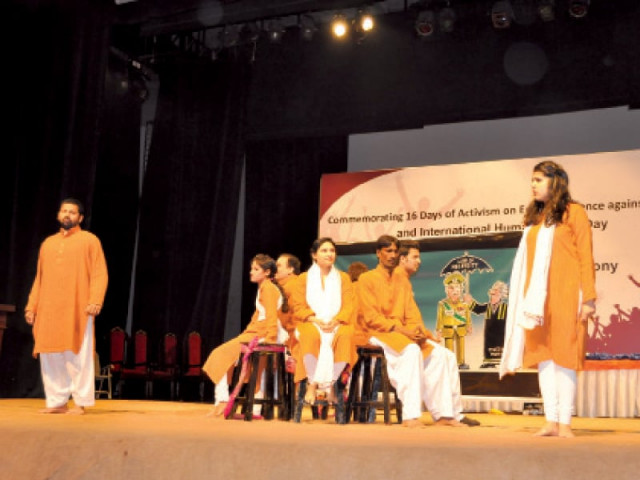Conference: ‘State responsiveness on women issues insufficient’
Say things have deteriorated in context of women’s overall condition.

Stage play highlights women-related issues. PHOTO: EXPRESS
Speakers have said that challenges and issues facing womenfolk need solutions rather than rhetoric and slogans by implementing the existed laws.
They were speaking at the concluding session of a conference on “women, peace and social harmony” as part of the 16 Days of Activism on Ending Violence against Women campaign at the Pakistan National Council of the Arts on Monday.
The conference was a part of Awaz, a consortium of five non-governmental organisations — Aurat Foundation (AF), South Asia Partnership Pakistan, Strengthening Participatory Organisation (SPO) Sungi Development Foundation and the Sustainable Development Policy Institute. The organisations conducted a series of activities on women’s issues across 45 districts of Punjab and Khyber-Pakhtunkhwa.
“There is not much to celebrate. Things have deteriorated more than they have improved, generally in the context of women’s overall condition in society, and in particular, with regard to state responsiveness on women’s issues,” said AF Chief Operating Officer Naeem Mirza.

He said that there is no institutional mechanism in place in the parliament to play the role of a watchdog on women’s rights. He also underscored key institutional mechanisms and processes to create spaces in public sphere to enable women to move ahead so their voices were heard, their demands met and their aspirations fulfilled. “The role of the law is limited as compared to customs, values and norms,” said Federal Secretary Barrister Zafarullah, underscoring the need to increase the strength of female lawyers in the country.
Pakistan Ulema Council Chairman Tahir Ashrafi said that peace and social harmony was not possible in a country where religion becomes a tool to achieve personal and political gains. “Things will not improve until the citizens stand up and reclaim the space that has been appropriated by ignorant and retrogressive forces that use religion for political purposes,” he said.
Neelam Toru of the Khyber-Pakhtunkhwa (K-P) Provincial Commission on the Status of Women spoke about socio-political barriers for women in her province. She pointed out challenges in the education and health sectors. “The commission is seeking to have the nikahnama registered besides raising awareness on the rights of the women to divorce.”
National Commission on the Status of Women (NCSW) chairperson Khawar Mumtaz said that interprovincial coordination committee needed to be strengthened and must play a more active role.

Speaking about Qisas and Diyat laws, Justice (retd) Nasira Iqbal said that in 1990, the Supreme Court gave a ruling that ‘offences against the body’ under the Pakistan Penal Code were against Islamic injunctions. Consequently, the laws were introduced. As a result, murder became a private matter and relatives of victims have been given the authority to decide whether to punish or waive the offense of murder. “The world over, punishment is the authority of the state, but in case of Pakistan the law has been distorted and authority is given to individuals.”
Speakers also said that anti-honour killing law has some lacunae which needed to be addressed.
Published in The Express Tribune, December 10th, 2013.












1724319076-0/Untitled-design-(5)1724319076-0-208x130.webp)






COMMENTS
Comments are moderated and generally will be posted if they are on-topic and not abusive.
For more information, please see our Comments FAQ